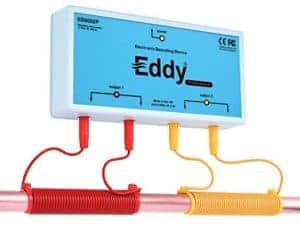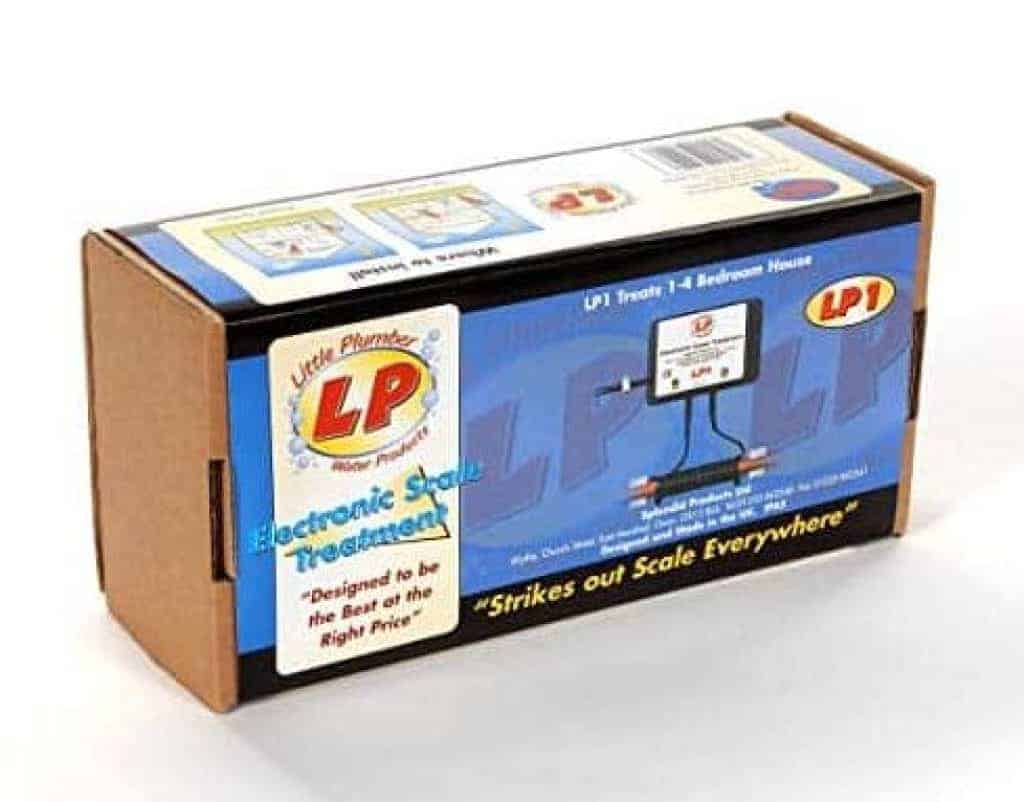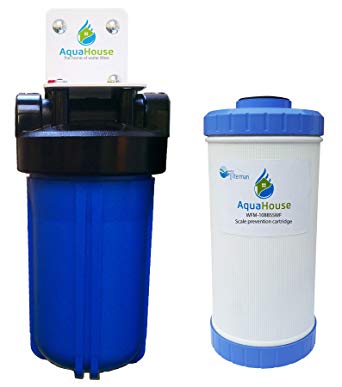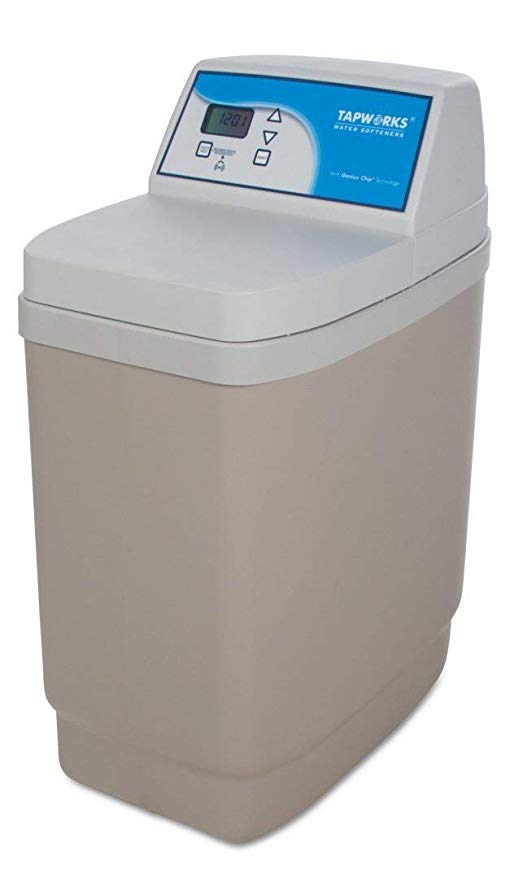If you already live in one of the UK’s hard-water areas then you probably won’t need us to convince you about the benefits of using a water softener and you may wish just to skip straight down to our review of the best water softeners in the UK, alternatively, if you’re curious to learn more details about them or if you are new to a hard-water area, then keep reading to find out a bit more detail about water softeners, their benefits and how they work.

Why you need a water softener in the UK
Many places in the UK have hard water, which is basically mineral-rich water. This is perfectly safe to drink (in fact there is some evidence to suggest that it’s actually healthier than soft water precisely because of the mineral content) but it’s horrendously damaging to household appliances and can shorten their lifespan siginficantly. This is bad enough with small appliances such as kettles and irons or steamers but can get really expensive when looking at major ones such as washing machines, dishwashers and boilers.
Different types of water softeners available in the UK
Basically, there are two types of water softeners commonly available in the UK. There are salt-free systems and salt-based systems.
The salt-free systems are technically descalers rather than water softeners in that they keep the chemical balance of the water the same, but either prevent limescale from forming or prevent it from adhering to surfaces (such as the inside of your appliances). Some work through electromagnetism and others work by using nanotechnology. The former, obviously, need a source of power (generally the mains) while the latter work passively. Salt-free systems tend to be very affordable and also very easy to install.
NB: while electromagnetic water softeners are perfectly efficient, some of them will not work past a break in the flow e.g. a water tank. If you have a water tank where the mains in and return pipes are next to each other, then you will need either to buy two units or to make sure to buy a unit which is powerful enough to cope with the break. This is only likely to be an issue if you have a water tank.
Salt-based water softeners genuinely do soften water, i.e. they actually change its chemical content, which means that in addition to preventing limescale, salt-based water softeners produce water which lathers well and loses the “hard-water taste”. They are, however, more expensive, bulkier and a bit more hassle to install, plus the use of salt is rather controversial from an environmental perspective, although modern water softeners do use it very economically.
NB: Salt-based water softeners generally work within a minimum and maximum pressure range so if your system is outside this then you may need to use some form of adaptor to bring the water pressure into the accepted range. Poorer quality salt-based water softeners may reduce the effective water pressure in your home, but good quality ones will have marginal to zero impact on flow (so you can still enjoy a good shower, in fact, you’ll have an even better one).
Points to consider before purchasing a water softener
Here are what we think are the key points to consider before purchasing a water softener.
Do you want to add salt?
In all seriousness, probably the first major decision is whether you’re going to go for a descaler or a salt-based water softener. If you are going to use salt then you will want to check what form of salt is required. Some water softeners specifically require either block salt or loose salt while others will work with both. You will also want to think about the position of the salt tank, i.e. how easy it is to fill (and also that it is protected from dirt getting in).
How big a capacity do you need?
This is more of an issue with tank-based water softeners (rather than the electromagnetic ones). Basically larger tanks will, of course, take up more space in your home, but they also tend to be more economical to run.
How easy is it to install?
Electomagnetic units can simply be fitted onto pipes (and connected to the electric), while nanotechnology units need to be connected to the actual water supply but not necessarily to the electric supply. Salt-based water softeners usually need to be connected to both and their ease of installation varies widely, however, one factor is key to success and that is using the right parts for your specific water supply. If you’re not familiar with this then you may wish to use an installation service or a local tradesperson/plumber.
Even the best water softeners will only work well if they are installed properly so it is really important to get this right.

A review of the best water softeners in the UK
Here is our round up of the best water softeners in the UK. We’ve included three descalers and three salt-based water softeners at various price points.
Eddy Electronic Water Descaler - Water Softener Alternative UK/EU Version

The Eddy seems to be the water softener of choice for people in London as it offers very decent performance in a very compact package and is therefore great for people living in city flats, especially if they’re renting as the Eddy is super-easy to fit and can be installed without any plumbing changes. It works on both metal and plastic pipes, the only exception being lead pipes, although these are now increasingly rare due to the health-and-safety issues they cause.
In the strictest, technical sense, Eddy is actually a descaler rather than a water softener as it replaces the customary salt with an electromagnetic wave. This preserves the chemical balance of the water, so it remains hard water, but acts to prevent calcium from adhering to surfaces and hence forming what we generally call limescale. On the one hand, this means that the taste of the water remains “hard” but on the other it means that you still get the health benefits of mineral-rich water.
Little Plumber LP1 (mains operated Electronic Water Softener)

Basically everything we said about the Eddy applies to the Little Plumber. Your choice between them will probably boil down to price, availability and/or personal preference.
AquaHouse NSWS Water Softener Alternative System

If you’re looking for a low-tech option which is also both very environmentally friendly (salt free) and very economical, then the AquaHouse NSWS could be the option for you. Like the options mentioned above, it is a descaler rather than a softener, i.e. the chemical balance of the water remains the same, so you get the mineral content without the limescale, but it works a bit differently.
Instead of using electric, the AquaHouse NSWS uses Template Assisted Crystallization (TAC), to prevent the Calcium and Magnesium from bonding (into limescale), instead it converts them into harmless, inactive microscopic crystals. Because it works passively, it does not need to be connected to the electric supply and therefore could be a great option for “off grid” locations.
Tapworks AD11 Water Softener Meter Controlled

The Tapworks AD11 is what we would call an entry-level, salt-based water softener, which puts it at the mid range of water softeners in general.
Unlike the products we’ve listed so far, the Tapworks AD11 water softener is a genuine water softener, rather than just a descaler. In other words, it uses salt to change the chemical balance of the water rather than just preventing limescale from sticking. This means you lose the mineral content of the water, but it also means that you will lose the associated taste.
At this point, you’d basically expect a water softener which “does the job” without anything much in the way of bells and whistles and that’s exactly what you get with the Tapworks AD11. What made this water softener stand out from others at this price point is that Tapworks really know how to create clear instructions, plus the popularity of the brand means that if you do have a question about it or need more clarity on anything to do with it, then you have an above-average chance of easily finding the specific answer online.
Water2Buy W2B200 Meter Water Softener with efficient meter for 1-4 people

The Water2Buy W2B200 will fit comfortably into a standard kitchen base unit (without a shelf), indeed one of the most obvious places to put it is beside the kitchen sink. It can process up to 1250 litres of water per day, which would be ample for up to four people, even in the heat of summer.
One of the reasons the W2B200 made it onto our list is that it is very user-friendly. After an easy installation, it is very intuitive to set up this water softener to your exact requirements (e.g. choosing the right level of water hardness). There is easy access to add salt and you can even opt to leave the top lid off as there’s a second lid over the salt filter itself.
Once you actually start to run the machine, you will find that it is not only very quiet (we particularly like the fact that it performs its regeneration at night) but also very economical, for instance it regenerates only when necessary and really uses very little salt (which is also good for the environment).
BWT WS455 Hi Flow Electronic Demand Block/Tablet Water Softener, Blue, 10 Litre

The BWT WS455 is also a water softener rather than a descaler. As with the W2B200, it’s user-friendly, efficient and economical plus the extra money gets you a few extra “high-tech” bonuses, which make it easier. The stand-out points are as follows.
There is an advanced memory function which allows the BWT WS455 to adapt its regeneration cycle to your usage patterns.
It uses high-capacity resin in a regular bead size to ensure the maximum quantity of water can be softened between regenerations.
Counter-current regeneration basically reverses the flow of the water to ensure that the whole resin bed is regenerated evenly and effectively.
Proportional brining means that the BWT WS455 only regenerates the part of the resin bed which has actually been used, thus eliminating the waste of both water and salt.
Overall the best water softeners in the UK
As always the best water softener in the UK is the one which works best in your situation. Those looking for an affordable and effective option without the use of salt will need to stick with descalers rather than water softeners. The Eddy and the Little Plumber have the advantage of compactness, but the AquaHouse is probably a bit easier to install, plus it works passively so you don’t have to think about connecting it to a power supply.
When it comes to the three, salt-based water softeners, the question is basically, “how much functionality do you need and/or want”. The Tapworks AD11 is a perfectly respectable product at a cost-effective price, while the Water2Buy W2B200 and the BWT WS455 both offer more functionality, but at a price premium, only you can decide if that price premium is justified in your situation.
Kevin is a fitness fanatic and award-winning product reviewer. With over 20 years of experience, Kelvin’s freelance offerings have been featured all across the web on such outlets as NY Times, Forbes Magazine and more and is a great asset to the team. Kelvin loves his job and passing on his knowledge. Appeared on TV numerous times. Always smiling and raising money for charity in between servicing the demand for his talents


















1 Comment